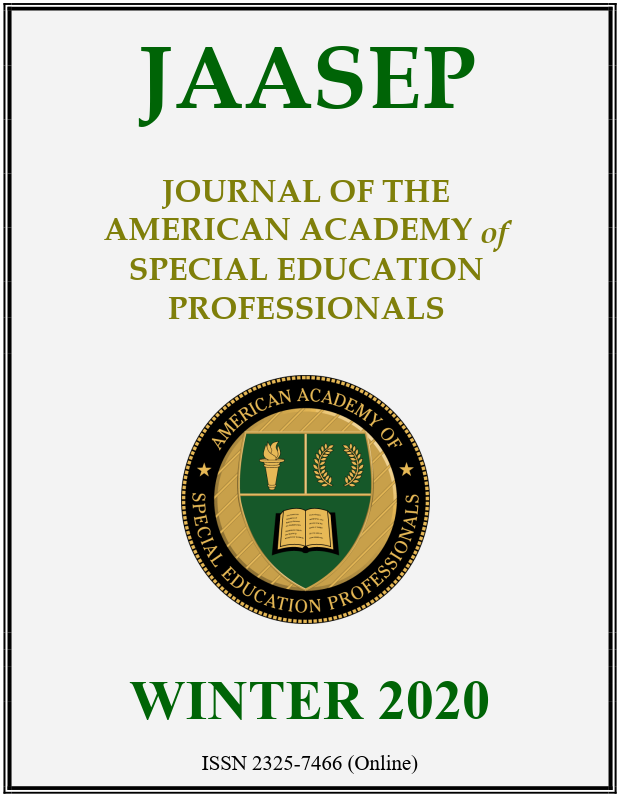Hopes and Hurdles: Parents’ Perceptions and Experiences with Transition Planning for Students with Intellectual Disabilities
Authors, (in press). Rebuilding the family-professional partnership through facilitated individualized education program meetings. Journal of Educational Psychological Consultation.
Armstrong, M. L., & Dorsett, P. (2015). Planning for gold: The personal journey of mental health wellness and its relationships with planning alternatives tomorrows with hope (PATH). Journal of Social Inclusion, 6(2), 36-50. DOI: https://doi.org/10.36251/josi83
Creswell, J. W. (2007). Qualitative Inquiry & Research Design: Choosing Among Five Approaches. Thousand Oaks, CA: Sage Publishing.
Darch, C., Miao, Y., & Shippen, P. (2004). A model for involving parents of children with learning and behavior problems in the schools. Preventing School Failure: Alternative Education for Children and Youth, 48(3), 24-34. doi:10.3200/PSFL.48.3.24-34 DOI: https://doi.org/10.3200/PSFL.48.3.24-34
Gillan, D., & Coughlan, B. (2010). Transition from special education into postschool services for young adults with intellectual disability: Irish parents' experience. Journal of Policy and Practice in Intellectual Disabilities, 7(3), 196-203. doi:10.1111/j.1741-1130.2010.00265.x DOI: https://doi.org/10.1111/j.1741-1130.2010.00265.x
Grigal, M., Hart, D., & Migliore, A. (2011). Comparing the transition planning, postsecondary education, and employment outcomes of students with intellectual and other disabilities. Career Development for Exceptional Individuals, 34(1), 4-17. doi:10.1177/0885728811399091 DOI: https://doi.org/10.1177/0885728811399091
Hayes, D. (2011). Predicting parental home and school involvement in high school African American adolescents. The High School Journal, 94(4), 154-166. DOI: https://doi.org/10.1353/hsj.2011.0010
Henderson, A. T., & Mapp, K. L. (2002). A new wave of evidence: The impact of school, family, and community connections on student achievement. Annual synthesis, 2002 National Center for Family & Community Connections with Schools, Southwest Educational Development Laboratory, 211 East Seventh Street, Austin, TX 78701-3281.
Henninger, N. A., & Taylor, J. L. (2014). Family perspectives on a successful transition to adulthood for individuals with disabilities. Intellectual and Developmental Disabilities, 52(2), 98-111. DOI: https://doi.org/10.1352/1934-9556-52.2.98
Hetherington, S. A., Durant-Jones, L., Johnson, K., Nolan, K., Smith, E., Taylor-Brown, S., & Tuttle, J. (2010). The lived experiences of adolescents with disabilities and their parents in transition planning. Focus on Autism and Other Developmental Disabilities, 25(3), 163-172. DOI: https://doi.org/10.1177/1088357610373760
Individuals with Disabilities Education Act of 1997, 34 C.F.R. §§ 300-301 (2015). Kellems, R. O., & Morningstar, M. E. (2010). Tips for transition. Teaching Exceptional Children, 43(2), 60-68. DOI: https://doi.org/10.1177/004005991004300206
Martinez, D. C., Conroy, J. W., & Cerreto, M. C. (2012). Parent involvement in the transition process of children with intellectual disabilities: The influence of inclusion on parent desires and expectations for postsecondary education. Journal of Policy and Practice in Intellectual Disabilities, 9(4), 279-288. doi:10.1111/jppi.12000 DOI: https://doi.org/10.1111/jppi.12000
Mazzotti, V. L., Rowe, D. A., Kelley, K. R., Test, D. W., Fowler, C. H., Kohler, P. D., & Kortering, L. J. (2009). Linking transition assessment and postsecondary goals key elements in the secondary transition planning process. Teaching Exceptional Children, 42(2), 44-51. DOI: https://doi.org/10.1177/004005990904200205
Mueller, T. G. (2009). IEP facilitation: A promising approach to resolving conflicts between parents of children with disabilities and school districts. Teaching Exceptional Children, 41(3), 60-67. DOI: https://doi.org/10.1177/004005990904100307
Mueller, T. G. (2017). Promoting Collaborative Partnerships with Families. In J.M. Kauffman, and D.P. Hallahan (Eds.), Handbook of Special Education (2nd ed.; pp. 773-792). New York, NY: Routledge. DOI: https://doi.org/10.4324/9781315517698-61
Mueller, T. G., & Vick, A. M. (2017). An investigation of facilitated individualized education program (FIEP) meeting practice: Promising procedures that foster family-professional collaboration. Teacher Education and Special Education, 1-15. doi:10.1177/0888406417739677 DOI: https://doi.org/10.1177/0888406417739677
Neece, C. L., Kraemer, B. R., & Blacher, J. (2009). Transition satisfaction and family well-being among parents of young adults with severe intellectual disability. Intellectual and Developmental Disabilities, 47(1), 31-43. doi:10.1352/2009.47:31-43 DOI: https://doi.org/10.1352/2009.47:31-43
Papay, C. K., & Bambara, L. M. (2014). Best practices in transition to adult life for youth with intellectual disabilities. Career Development and Transition for Exceptional Individuals, 37(3), 136-148. DOI: https://doi.org/10.1177/2165143413486693
Reilly, R. C. (2013). Found poems, member checking and crises of representation. Qualitative Report, 18, 18.
Rubie-Davies, C., Hattie, J., & Hamilton, R. (2006). Expecting the best for students: Teacher expectations and academic outcomes. The British Journal of Educational Psychology, 76(3), 429-444. DOI: https://doi.org/10.1348/000709905X53589
Shogren, K. A., & Plotner, A. J. (2012). Transition planning for students with intellectual disability, autism, or other disabilities: Data from the national longitudinal transition study-2. Intellectual and Developmental Disabilities, 50(1), 16-30. DOI: https://doi.org/10.1352/1934-9556-50.1.16
Strnadova, I., & Evans, D. (2013). Schooling transitions within the lifespan of people with an intellectual disability: Perceptions and recommendations of ageing mothers. Australasian Journal of Special Education, 37(1), 64-78. DOI: https://doi.org/10.1017/jse.2013.7
Test, D. W., Fowler, C. H., Richter, S. M., White, J., Mazzotti, V., Walker, A. R., . . . Kortering, L. (2009). Evidence-based practices in secondary transition. SAGE Publications and Hammill Institute on Disabilities. 2455 Teller Road, Thousand Oaks, CA 91320. DOI: https://doi.org/10.1177/0885728809336859
Turnbull, A. P., Turnbull, H. R., Erwin, E., Soodak, L., & Shogren, K. (2011). Families, professionals, and exceptionality: Positive outcomes through partnerships and trust (6 ed.). Upper Saddle River, NJ: Merrill/Prentice Hall.
Walton, R., & Dennison, T. (2015). Person-centred care in practice to improve a client’s quality of life. Learning Disability Practice, 18(3), 32-34. DOI: https://doi.org/10.7748/ldp.18.3.32.e1547
White, J., & Rae, T. (2016). Person-centred reviews and transition: An exploration of the views of students and their parents/carers. Educational Psychology in Practice, 32(1), 38-53. doi:10.1080/02667363.2015.1094652 DOI: https://doi.org/10.1080/02667363.2015.1094652
Woolley, M. E., Strutchens, M. E., Gilbert, M. C., & Martin, G. W. (2010). Mathematics success of black middle school students: Direct and indirect effects of teacher expectations and reform practices. Negro Educational Review, 61(1-4), 41-59.
Zeitlin, V. M., & Curcic, S. (2014). Parental voices on individualized education programs: 'Oh, IEP meeting tomorrow? Rum tonight!'. Disability & Society, 29, 373-387. doi:10.1080/09687599.2013.776493 DOI: https://doi.org/10.1080/09687599.2013.776493
Downloads
Article Information
- Article Type Articles
- Submitted January 5, 2020
- Published February 15, 2020
- Issue Winter 2020
- Section Articles
